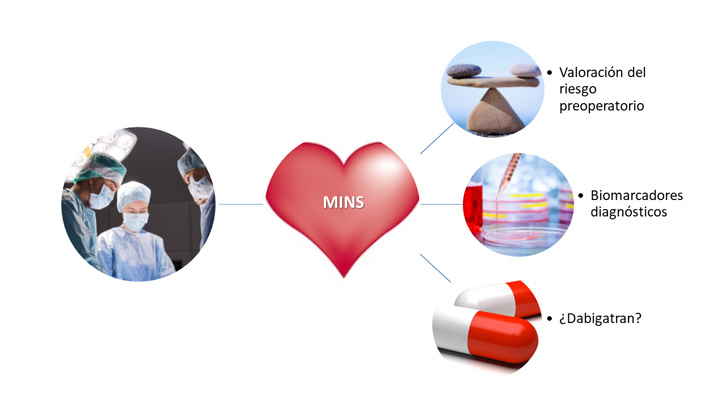Myocardial injury after noncardiac surgery: could dabigatran be a first step in its management?

Myocardial injury after noncardiac surgery (MINS) is the most frequent cardiovascular complication after surgery - between 15% and 18% of all patients- and implies a worse prognosis. This entity was defined first in the VISION study, which involved researchers from UAB. Moreover, the study revealed that almost 85% of patients with MINS did not show ischemic symptoms, and most had no detectable electrocardiographic changes. Accordingly, MINS was a usually missed and potentially lethal postoperative complication. Since then, main perioperative care guidelines now recommend the systematic and perioperative determination of troponin levels in patients with high cardiovascular risk.
In case of a patient suffers a MINS, what must we do? How we can improve the prognosis? To date, all preventive measures have failed, and only a careful preoperative assessment aimed at controlling cardiovascular risk factors is recommended. However, from the therapeutic point of view, the MANAGE 1 study has recently showed that the administration of an anticoagulant - drugs that prevent the formation of clots - such as dabigatran reduces the occurrence of cardiovascular complications in patients who have presented a MINS.
The MANAGE study is an international clinical trial which involved researchers from UAB 2. The trial randomized more than 1700 patients to receive dabigatran or placebo - a substance that is not medicine, but that is given to someone who is told that it is a medicine, used to test the effect of a drug- for 2 years. The hypothesis was that dabigatran would reduce cardiovascular complications in patients who had undergone major noncardiac surgery and experienced MINS. After a mean 16-month follow-up, the composite efficacy outcome was recorded in 97 patients (11%) in the dabigatran group vs 133 (15%) in the placebo group, giving a relative risk reduction of 28%. Regarding to safety perspective, the main safety outcome was observed in 29 patients (3%) in the dabigatran group vs 31 (4%) in the placebo group, indicating no significant risk difference. However, there were significant increases in the incidences of minor bleeding, clinically insignificant lower gastrointestinal bleeding, and dyspepsia - any symptom, such as discomfort or pain, coming from the upper digestive tract- in the dabigatran group. Notably, more than 40% of the patients in both groups discontinued the study drug.
But now, can we already apply these findings to daily clinical practice? We should be cautious because the recruitment period was long and there was a high rate of medication abandonment. Possibly in the future, patients with high cardiovascular risk who undergo major surgery and without early perioperative complications will benefit most from low doses of dabigatran after careful evaluation of their hemorrhagic risk.
The second major question that can be asked is how dabigatran modifies the prognosis of patients who have MINS. It is logical to think it is for reducing thrombosis or embolism. However, it is also possible that it is due to an imbalance between the supply and demand of oxygen (“fuel”) that reaches the heart muscle. There are still many doubts to be resolved. Thus, investigators from UAB are conducting a study to clarify the mechanisms involved in MINS, with the systematic approach of a clinical heart assessment and the support of a complete advanced cardiac imaging study (the ACE-CARD study 3). At this moment, the findings of MANAGE trial support the thrombotic cause play an important role and open a door of hope for the treatment of a frequent, silent and potentially lethal complication.
Institut de Recerca Hospital de la Santa Creu i Sant Pau
Universitat Autònoma de Barcelona
Miriam de Nadal
Hospital Vall d’Hebron
Universitat Autònoma de Barcelona
Ekaterina Popova
Institut de Recerca Hospital de la Santa Creu i Sant Pau
Universitat Autònoma de Barcelona
References
Devereaux PJ et al. Dabigatran in patients with myocardial injury after non-cardiac surgery (MANAGE): an international, randomised, placebo-controlled trial. Lancet. 2018;391(10137):2325-2334.
Álvarez-García J et al. Myocardial Injury After Noncardiac Surgery. Could Dabigatran Be a First Step in Its Management? Rev Española Cardiol (English Ed. 2019;72(10):803-805.
Popova E et al. Rationale and design of perioperative myocardial ischemia: a protocol for troponin monitoring, prognostic thresholds, economic analysis and further insights into pathophysiology for non-cardiac surgery patients. F1000Research. 2019;8 (850).

